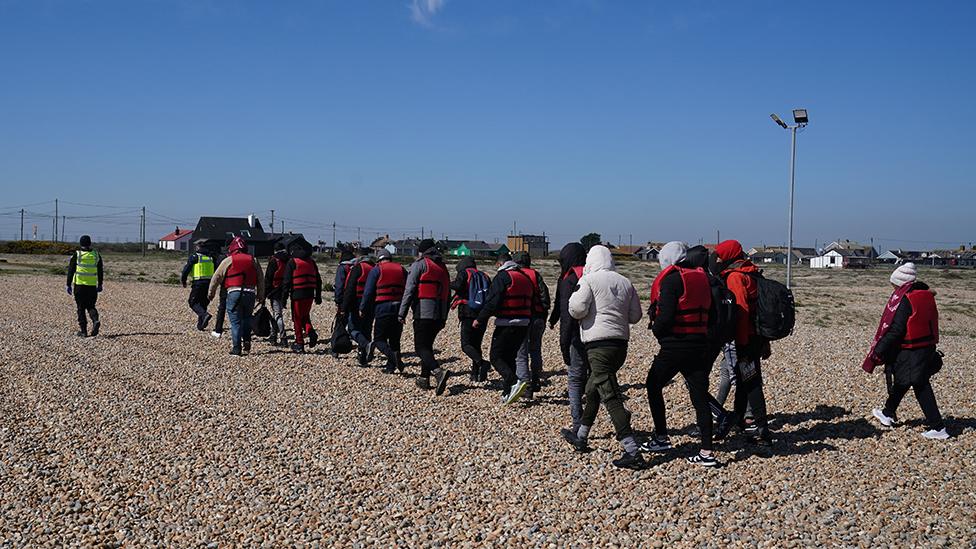Home Office admits asylum plans in doubt
- Published

Asylum seekers who arrive by small boat face long waits for their claims to be decided
Plans to improve the asylum system are "in doubt" unless the Home Office takes urgent action, the department has told the government's spending watchdog.
The National Audit Office revealed the admission in a highly critical report warning plans to make the asylum system more efficient are not on track.
One of the factors was Home Office delays in deciding asylum claims, the watchdog said.
The Home Office said it was working non-stop to reduce backlogs.
But earlier this week, Home Secretary Suella Braverman said at the current rate of processing the government could fail to meet the prime minister's target of clearing the backlog of asylum claims.
The backlog of 173,000 people waiting for an initial decision on their claim means the Home Office is spending an estimated £3.6bn a year on asylum support.
In April, Home Office chiefs classified their department's progress on speeding up the asylum system as "amber-red", the NAO report reveals, meaning it was "in doubt, with urgent action required and possible delays to delivery".
Safeguarding concerns
The NAO said the Home Office case for a £430m programme of improvements to the asylum system was based on "highly uncertain assumptions".
Risks remained high, including the demand for accommodation for asylum seekers exceeding supply
The proportion of asylum applicants waiting more than six months for a decision had been increasing for five years.
And that slowdown in decision-making had increased the demand for accommodation.
But the Home Office was failing to meet its targets to secure enough places for people to stay.
And even after decisions were taken, only 0.4% of those who had no case to be in the UK were suitable to be removed from the country, because of problems relating to documentation or medical and safeguarding concerns.
'Lost control'
NAO head Gareth Davies said: "Despite recent progress, the asylum and protection transformation programme is a long way from meeting government's ambitions to reduce the cost and improve the quality of the service.
"The Home Office has nearly doubled the number of decisions made each week - although, it is unclear whether it will be enough to remove the backlog of older asylum decisions by the end of 2023."
Oliver Lodge, director of the spending watchdog, said it was going to be "very challenging" for the government to hit to target.
He said the Home Office was making 1,300 asylum claim decisions a week in April. To meet its objective, Mr Lodge said the government needs to process 2,200 claims a week.
But if claims are refused quickly, other teams "will have to increase their capacity" and shoulder the costs and increase their staffing levels.
He told BBC Radio 4's Today programme: "The backlog pushes costs to the wider asylum system if it isn't done intelligently."
A Home Office spokesman said it was working "non-stop" to reduce the backlog and had already doubled the number of caseworkers and cut the "legacy backlog" by 20% - the pile of more than 100,000 unresolved asylum applications made before 28 June 2022.
"We know more must be done to bring the asylum system back into balance," he said.
"The Illegal Migration Bill will stop the boats by detaining those who come to the UK illegally, and swiftly returning them to their home country or a safe third country."
The National Audit Office's report said only half of case workers are taking decisions, falling short of the Home office's target of 62%. Cuts in the "legacy backlog" had been achieved by slowing down decision-making on newer claims, it found, meaning a new backlog was growing there.
Labour shadow immigration minister Stephen Kinnock said the Conservatives had "lost control" of the backlog.
"The prime minister has admitted that the asylum system is broken," he said.